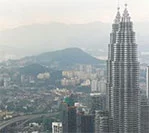WE CAN’T LIVE IN THE PAST: We have to look beyond nonsensical issues so that the vast number of present and future Malaysians are well provided for
OLDER Malaysians just love nostalgia and perhaps at no time more so than around August-September. Black-and-white memories of carefree childhoods, teenage romances and the adventure of first jobs, marriage and parenthood fit nicely with those of a new nation brimming with confidence and idealism.
The late 1950s and early 60s are times fondly remembered for their simplicity, warmth and innocence. As the iconic Petronas advertisements every year show, the idea of a nation forged by a happy brotherhood of races, with few cultural barriers and hang-ups, continues to have great appeal.
Never mind that the truth may be a little different. In the immortal words of L.P. Hartley in his book The Go-Between, “the past is a foreign country; they do things differently there”. The past anchors us, myths and all, to the present, but we cannot live there. Just ask our youths of today and watch their blank expressions.
When Malaya gained independence in 1957, there were around six million of us. This rose to almost nine million in 1963, when the Federation of Malaysia was established with the inclusion of Sarawak and Sabah. (In so many ways, 51 years later, these two states are still trying to find their place.)
Singapore has never been included in official statistics and made little difference when they eventually separated in 1965. Its advance to first world status gives rise to interesting “what-if” questions but it should be remembered that two million of them were also struggling in the mid-1960s.
Far from the sentimental recollections, socio-economic conditions were – how do I put it? – terrible. Only 51 per cent of the adult population then could read and write. Malaysians could only expect to live for a mere 56 years. Household incomes were a little more than RM200 a month and poverty was rife. The list goes on.
Not surprisingly, with so little to go around, communities were on edge. Except maybe for the urban middle class, notions of country idyll and rasa sayang do not square with the serious political studies done – either in the run-up to Independence and certainly not after.
From the outset, in 1957, it was recognised that Malaysians could not continue living in the country that they had. They had to change the country as it was and, in so doing, start to build a nation. Boring as it may now sound, the means to this was through rapid (repeat, rapid) economic and social development.
In every decade, however, the task has become ever larger and more challenging. In 1970, at the start of the New Economic Policy, there were 11 million Malaysians to be catered for. In 1980, with the launch of heavy industrialisation and import-substitution attempts, there were just 14 million.
During the good times of the 1990s, there were still only 18 million of us. For some reason this decade was a particularly prolific one because by the end of the decade, after the Asian Financial Crisis in 1997, there were 24 million. Perhaps immigration had something to do with this.
In February of this year, our population crossed the 30 million mark. We are five and 3.5 times larger than at Independence and Federation respectively. By 2020, the official estimate is that the country will touch 32 million. This assumes, however, some heroic declines in population growth rates.
One does not have to be a population pessimist in this day and age. Not all countries whose populations have grown have faced dismal futures. But collective eyes need to remain on the economic ball. Economic growth, and the social development that it allows, cannot be allowed to decline.
Yet everything points to our drifting attention. Instead of ensuring that the vast numbers of Malaysians, present and future, are adequately provided for, we are going at each other hammer-andtongs over trivial, even nonsensical, issues. We seem determined to return to the dark recesses of the past.
At our present rate, we will get there. At the risk of brickbats, economic growth rates are not fast or sustainable enough to keep the changing of the country relative to the growing number of Malaysians, who are becoming increasingly disenchanted, noisy and regressive.
Those who look longingly to the past, when things were, alternatively, either more civilised or controlled, may have a point. But the past is a much smaller and infinitely poorer foreign country that we should never want to revisit. Neither should we allow political or economic reactionaries to take us there.
Happy Malaysia Day.
Article by Dato’ Steven Wong which appeared in The New Straits Times,
9 September 2014.





